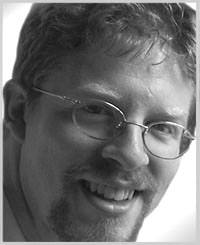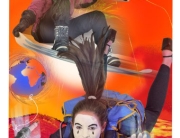Jon Ritzdorf is an adjunct instructor of translation technologies and localization concepts at both New York University and the Monterey Institute of International Studies who loves his job. In the classroom, he strives to empower translation newbies as well as veteran professionals through in-depth instruction of language technology, website localization and the business of translation. Just this year, Jon launched the Ritzdorf Academy website to promote both his university sponsored and private courses to a wider audience. You can sign up for email updates about upcoming classes at http://www.ritzdorfacademy.com/courses.php.
1. What do you love about your job?
All depends on which job we’re talking about, my full-time job in the translation industry or my part-time job teaching. That said, in either case I just love to educate. I could honestly say the adjunct work has been the most fulfilling aspect of my life outside of being a father. I started teaching as a result of feeling that what I was taught in the formal academic environment (when I was working toward my M.A. in Chinese translation) did not jibe with the reality I was confronted with in the translation agency world of buying and selling translation. I thought to myself that there had to be a way to bridge the knowledge gaps that newly minted graduates of translation, and even long-time professionals seemed to have when it came to understanding how to succeed as a freelance translator. I get a rush of excitement every time I see students empowered with this knowledge, especially when it takes them far beyond the subject matter and into the deeper level of making them confident, competitive forces in the translation industry.
2. Did you always know this was the job or career path for you?
Education is in my blood I guess. My mom was a college professor who loved to teach and I used to have lengthy discussions with her in high school about how and why certain ways of teaching seemed to be effective. I already had strong opinions on how I wanted to change the entire education system back in high school, and, like a typical cocky teen, kept saying I would come back someday to show those teachers how it should be done. My argument was that effective teachers were also good entertainers. I’ll never forget certain teachers and I try to emulate them to this day, like my wacky physics professor who came to class in his 70’s era, polyester, “E=mc2” print dress shirt with the butterfly collar out to there. That image and his unique teaching methodologies always stuck with me; the idea that if you can hold a group’s attention through your speech, actions and even having a particular “look,” at least a fraction of what you teach will never be forgotten. I’m still convinced that good educators are inherently great at entertaining large audiences and use their classroom as a stage. I took a lot of acting classes in my younger days, so I guess that, and a passion to change established educational conventions, has indirectly led to where I am now.
3. What are the most important lessons you have you learned along the way?
I definitely learned there’s nothing wrong with humor in the classroom, even self-deprecating comments, or a little teasing of students during class is fine as long as you can do it with a smile so no one takes it too seriously. Also a huge part of being a teacher is learning to admit fault or simply acknowledging if you don’t know something well enough to speak to it. Luckily I get wonderful students every year who constantly challenge me. Nicole, who requested I do this interview, is one of those students who was very outspoken and would keep me on my toes a lot. I’ve learned that it’s OK to let students challenge your thinking even though you are in an artificially “authoritative” position when instructing. My students constantly help me form new opinions and give insight that spawns ideas for new classes, new ways to approach the teaching material and just helping me to be a better educator overall.
4. Tell us about a defining moment for you related to your work.
When teaching my very first class ever, Computer Assisted Translation (CAT) in the summer of 2003, we had two highly technophobic students: one who didn’t even know where to insert her floppy disk to save her work (yes, still using 3½ inch floppies back then), and another student who would break down in tears over the most basic computing tasks, like creating a folder. I spent a lot of time after class with them both, trying to help. By the end of the course not only were they able to master the basics of computing, but also able to use fairly advanced translation software. Both students were extremely grateful for help conquering their fears, and from that point forward I realized that the classes I was teaching had less to do with teaching the software and more about building confidence. Also, around that time I came to understand that teaching technical courses is not about telling students to “click here, do that” but rather about helping them nail down general concepts that will continue to be meaningful over the long-term. Early on, I gained a reputation for being good with the stereotypical, “non-tech” humanities-minded translators, probably because I come from the same background and went through all the same struggles.
5. What advice do you have for people looking to find work they love, in your field, or any field?
It’s all about determination and a willingness to persevere in the beginning. If you really want to teach badly enough, keep pushing. I only got my chance because I stopped at nothing to contact the directors in charge of the various translation programs, scheduled times to meet with them, came into their offices, made my case as to why they should consider opening classes in my area of specialization and followed up with emails and more phone calls. If there’s an opportunity and you show enough passion for the work, it’s difficult for others to deny that and not give you a shot even if you’ve never taught before.











@Jon, I’m glad to hear I challenged you — you challenged me on being lazy! And you were right, I was coasting. I think your exact words were “You can do better than this.” After, I worked a lot harder and learned a lot more than I had expected, and it was worth it.
Hey Jon and Nicole. It is great to read such enthusiasm on both sides. That is another one of your teaching strengths, Jon. I guess I was one of those non-tech humanities-minded students and you are right on about the confidence building. I would have never thought that I’d be working with websites and translations! I also think open, relaxed and fun learning environments really ignite the atmosphere and are a gift when you come by them.